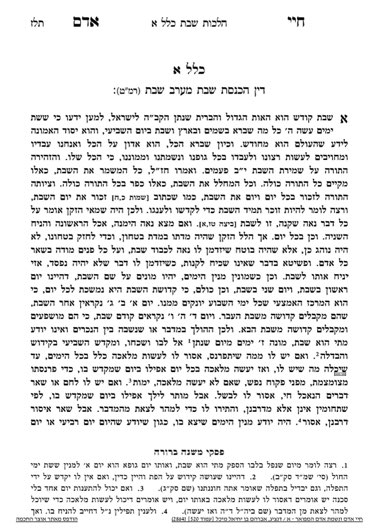We are continuing in siman 1. To review, the Chayei Adam brought the personal approach of Shammai Hazakein in terms of buying items for Shabbos, and set it as the standard as to how a person should act. The Chayei Adam continued, and wrote that Hillel would wait until the end of the week to begin his purchases for Shabbos. We learned that the reason Hillel did so is because if a person could purchase something Erev Shabbos, it has a benefit and preference because it is clear to others that they are purchasing it for the sake of Shabbos.
The Chayei Adam now gives a second reason to Hillel’s actions. He writes that Hillel worked on his special relationship with Hashem for Hashem to provide whatever he wanted. Hillel used this area of endeavor as an opportunity to work on the concept of bitachon, that Hashem would provide for him. The Chayei Adam clarifies that this was Hillel’s specific, personal journey. Even Hillel would agree that the appropriate approach is in accordance with Shammai. Certainly, something which will maintain its freshness until Shabbos, and is not generally readily available to purchase, should be purchased when given the opportunity, even if it is not Erev Shabbos.
Thus, so far we have seen two elements of zachor es yom hashabbos lekadesho: thinking about Shabbos during the week, and purchasing items for Shabbos as they present themselves during the week.
The Chayei Adam moves on to another aspect of how to fulfill the concept of zachor es yom hashabbos lekadesho. He writes that when a person counts the days of the week, they should do so based on Shabbos. For example, they should say hayom yom rishon leshabbos, today is the first day of Shabbos.
The Chayei Adam explains this idea based on an esoteric concept. He writes that when we say today is the first day of Shabbos, we are not just counting towards Shabbos and fulfilling the mitzvah of zachor es yom hashabbos lekadesho. In truth, the day is in some way connected to Shabbos, because Shabbos is the source of holiness which emanates to the whole week. Therefore, we look at Shabbos as the apex of the week, and the kedusha of Shabbos spreads itself to the days beforehand and afterwards. If so, it is not incorrect to say that today is the first day of Shabbos, second day of Shabbos, etc., because each day is connected to Shabbos in some aspect.
The Chayei Adam points out that the first three days after Shabbos are still connected to the previous Shabbos, and the next three days after Shabbos connect to the coming Shabbos. The fact that the first three days after Shabbos are still connected to Shabbos is what allows one to recite havdalah later in the week (until sunset on Tuesday). One does not recite the bracha of ner or besamim, but would recite hagafen and the paragraph of hamavdil.
Beginning from Tuesday night, the days are considered connected to the coming Shabbos. One of the ways we express this idea is through the Shir Shel Yom. On Friday night, we begin Kabbalas Shabbos with the chapter of tehillim which begins with lechu neranena. We recite the first three pesukim of that chapter of tehillim at the end of the Shir Shel Yom on Wednesday. Those pesukim are not from the chapter of Tehillim recited on Wednesday (keil nekamos Hashem), but are of the following chapter. Nevertheless, they are added to the Shir Shel Yom of Wednesday to show that we are now in the mode of focusing on the coming Shabbos.
Practically, we count the week from the beginning of the week towards the coming Shabbos, and we do not differentiate between the first three and last three days of the week. Nevertheless, we see that the entire week has a connection to Shabbos, so we refer to the days of the week as the __ day of Shabbos.
Summary
The mitzvah of zachor es yom hashabbos lekadesho teaches that one should have Shabbos in mind already from the beginning of the week. We fulfill this mitzvah in a few ways:
- To purchase items lchavod Shabbos as they present themselves throughout the week.
- To verbalize that the purchase is for Shabbos when making the purchase.
- To count the days of the week based on Shabbos, by saying that today is the __ day of Shabbos.



